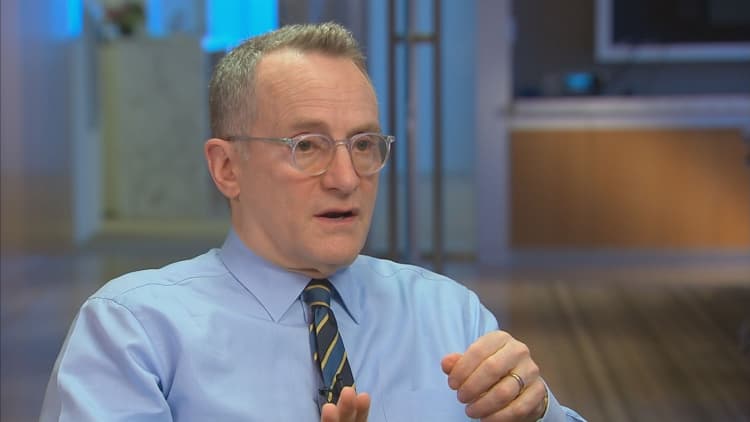There are two ways to approach the market. You can guess which direction prices will go in next, or you can figure out what businesses and their securities are really worth.
Howard Marks, the subject of our latest "Value Spark" interview, veers toward the latter camp. And the success of Oaktree Capital Management, which he co-founded more than 20 years ago and today has roughly $100 billion in assets under management, is predicated on that.
(Watch the full interview with Howard Marks here.)
"As Ben Graham pointed out, the day-to-day market isn't a fundamental analyst; it's a barometer of investor sentiment," Marks noted recently in one of his widely followed memos. "You just can't take it too seriously."
Except that many do. Entire populations of market strategists, fund managers and economists are employed to try and intuit for clients which securities to bet on for the best possible return each year, or quarter.

It's extremely difficult — perhaps futile — to time the market. Meanwhile, investors such as Marks and Warren Buffett are working to prove that's not the case with valuing securities, or identifying good businesses.
It's not easy to do such valuation, which is perhaps why so few do it. "It's Not Easy" was in fact the title of another of Marks' memos last September. Quoting Buffett's partner, Charlie Munger, he wrote of investing: "It's not supposed to be easy. Anyone who finds it easy is stupid."
He gave Regal Cinemas as a past example. The theater chain had, along with rivals, over-expanded in the 1990s in a chase for profits. "There were too many seats for too few behinds," Marks told us. After Regal went bankrupt, when few investors wanted to go near it, Oaktree got involved.
The firm invested in Regal's distressed debt, and eventually got control of the company. It spent years making operational improvements, and finally took the rehabbed chain public again. "That was one of our greatest successes," Marks said.
Too often, the public can fall into the trap of investing when stock prices are rising, not dropping. For Marks, the opportunities to invest generally dry up the more asset prices rise.

"It takes a special emotional control and a special insight to feel better when they go down," he said, referring to asset prices, "and thus present bargain purchase opportunity."
The sell-off at the start of 2016 was one particular opportunity, he said. Oaktree had a list of "15 or 20 distressed credits" it wanted to buy; "when prices gapped down, we bought all we could," Marks said.
During the crisis of 2008-09, when most people in the market were panicking, Oaktree was investing "half a billion dollars a week."
"The biggest trap in our business is people who respond to short-term performance," Marks said. "We have not changed how we do business," even after Oaktree went public in 2012. "We will not change how we do business."
— By CNBC's Kelly Evans. Follow her on Twitter: @Kelly_Evans


